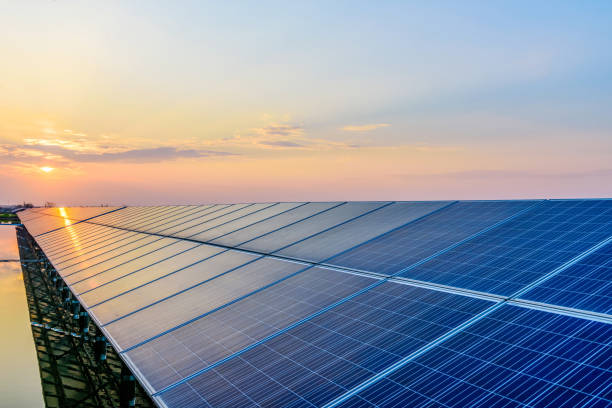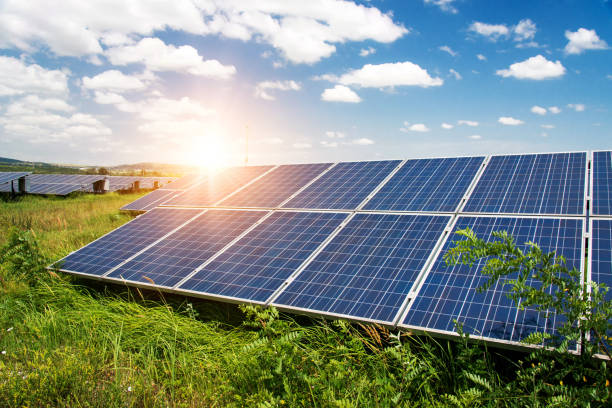You may know that renewable energy helps save the environment and reduces your energy consumption, but do you know that there are several economic benefits of solar energy?
The renewable and carbon-free nature is also linked to the environmental and economic benefits of solar energy. Additionally, its availability makes people depend less on imported fuels. You can power your home with an efficient solar panel system even when there are large clouds.
The Economic Benefits of Solar Energy: What is Solar Energy?

We can define solar energy as the renewable and sustainable power gotten from the sun’s radiation. This energy is captured using a range of technologies like photovoltaic cells or solar panels, which convert sunlight into electricity and it is the most common type of renewable energy.
Solar power is a clean and eco-friendly alternative to fossil fuels, reducing greenhouse gas emissions and environmental impact. It offers a viable solution for powering homes, businesses, and even entire cities, contributing to energy independence and sustainability. Solar power is a key player in the transition to a greener and more sustainable energy future.
The Economic Benefits of Solar Energy: Impact on the Society

In today’s world, where concerns about climate change, energy security, and economic stability are paramount, there are several economic benefits of solar energy sources. As countries seek to transition away from fossil fuels and embrace cleaner, more sustainable sources of power, solar energy emerges as a key solution.
Despite technological advancements, renewable energy systems have yet to fully replace fossil fuels. Government agencies even took a step further to impose tax credits to encourage the use of renewable energy sources, which were previously much more expensive than what is available today.
However, the direct expenses associated with solar and wind energy have decreased for consumers due to increased production, government subsidies, and mounting environmental concerns. For consumers, the economic benefits of solar energy make them more affordable than fossil fuels in some markets. Solar energy is used for both commercial and residential purposes, unlike wind energy, such as wind farms.
Key Stats on the Economic Benefits of Solar Energy
- In the next five years, solar photovoltaic installations will soar in the U.S. due to a sharp reduction in the price of solar power
- The economic benefits of solar energy are also aided by corporate investments in solar systems
- Solar panels can increase the value of your property by up to 4.1%
- Globally, renewable energy employs over 10 million people and creates more than 500,000 new jobs each year. Solar energy is expected to create more jobs as more people switch to it
- Between 2016 and 2026, the U.S. Bureau of Labor Statistics (BLS) forecasts 105% growth for solar photovoltaic installers
- For every dollar you save on energy bills by installing solar panels on your house, its value increases by approximately $20
10 Economic Benefits of Solar Energy

It’s no secret that there are several economic benefits of solar energy which is why many businesses and homeowners are switching to it. Your family and community can benefit economically from solar power in the following ways:
1. Reduces utility bills
One of the most significant economic benefits of solar energy for homeowners and businesses is the potential for cost savings on utility bills. By generating electricity from solar panels, individuals and organizations can reduce their reliance on grid electricity and lower their energy bills over time.
Also, this form of energy uses ultraviolet rays to create clean energy, which can reduce your home’s electricity bill. Thus, you’ll be able to recover your costs over time, allowing you to save money.
Net metering is a process in which your utility company allows you to sell excess energy produced by your solar panels. As a result of the clean energy you’ve created, others in your community can enjoy it, while your electricity bill is lower. Your location can have a significant impact on the amount of money you save.
2. Job creation
One of the economic benefits of solar energy is that it creates jobs for the community, ranging from manufacturing and installation to research and development.
This expansion not only provides employment opportunities but also stimulates economic growth and innovation in related sectors. There is a growing demand for energy workers as more people become interested in solar sources.
Renewable energy is a source of employment for millions of people. This results in many jobs in marketing, engineering, manufacturing, installation, and sales, among others, in the solar industry.
3. Incentives for installation
Households and businesses that install solar panels can take advantage of various incentives and tax credits. Solar investment tax credits, for example, make it possible for you to receive federal incentives for installing solar panels.
North Carolina is also one of the states that offer incentives. As a result of these incentives, the price of purchasing and installing your solar panels can be reduced, contributing to the economy. Installing solar panels can be made more affordable by these credits and incentives.
4. Stabilizes energy costs
Although solar energy companies offer great incentives, the initial cost of installing a solar system can be substantial. The PV modules are also cheap to operate once you’ve made the initial investment. This is because they do not require fuel to operate. As oil prices fluctuate, electricity prices fluctuate as well. By removing this factor, we can see some economic stability.
5. Enhances the resale value of a home
Trying to increase your house’s value? Solar energy systems are highly appreciated after they are installed in homes. Photovoltaic modules installed on the home add value to its purchase for potential home buyers. Buyers are attracted to homes with fully sustainable energy systems because of the potential savings.
6. Limiting time-of-use fees
You may be charged more when you run your appliances after work or during dinner in some states. As a result, electricity bills go up. Use it during the day or early in the morning to save money. Power storage systems and solar energy allow you to run your appliances whenever you like. You can use solar energy without incurring additional costs by storing it in a battery whenever you wish.
7. Reducing the economic impact of climate change
Climate change affects a wide range of sectors negatively. Numerous studies estimate that over 22 vital sectors will be affected. North America has already experienced climate disasters worth $415 billion in the last three years, according to Morgan Stanley.
All sectors are vulnerable to agricultural losses. As a result of climate change, heat waves, forest fires, and flooding have increased. Farmers may increase prices as they try to adapt to this. Consumers bear the costs.
Increasing sea levels, extreme weather events, and poor air quality are all affecting the world. In contrast, switching to solar energy slows down climate change’s effects. Economic losses can be avoided by preventing some catastrophic events.
8. Sustainability
Among its many advantages, solar energy ensures sustainable living. Fossil fuels like natural gas have been debated for years about whether they are sustainable. In most cases, it is about the planet’s ability to maintain a steady supply of those resources. Doubts about the sustainability of this industry are also fuelled by the yearly increase in production costs.
A way to combat this challenge is to use solar power. With unlimited solar energy, there is no need to worry about spills, shortages, or explosions. It is therefore a valuable energy source for powering an economy due to its steady supply and availability.
9. An improvement in public health
Greenhouse gas emissions and air pollution can be reduced using solar energy, which can have a positive impact on the environment and public health. As a result, healthcare costs can be reduced and quality of life can be improved.
10. Reducing climate impacts
Approximately $240 billion has been lost to the U.S. economy each year as a result of climate change, according to a recent report from the Universal Ecological Fund. As a result of climate change, the U.S. is projected to lose up to 10% of its economic growth by the middle of the century, the Fourth National Climate Assessment found.
Climate change, worsening air quality, and rising sea levels all contribute to these economic losses. Climate change could be slowed down if fossil fuels were switched to renewables.
Future Trends and Innovations in Solar Industry

- Potential for hybrid solar energy systems: Hybrid solar energy systems, which combine solar photovoltaic (PV) technology with other renewable energy sources such as wind, biomass, or geothermal, offer several advantages, including…
- Advancements in solar storage technologies: As the penetration of solar energy increases, the demand for energy storage solutions also grows to address intermittency and grid stability issues. Advancements in battery storage…
- Integration with other renewable sources: Integration of solar energy with other renewable energy sources, such as wind, hydroelectric, and geothermal, offers synergistic benefits and enhances overall energy reliability and resilience.
Conclusion
The economic benefits of solar energy include helping you save money on energy bills and increasing your home’s resale value at the same time. Furthermore, investing in solar systems will give you satisfaction knowing you are slowing down global warming and ensuring environmental conservation. Creating jobs in the solar industry reduces unemployment as well.
The economic benefits of solar energy make it a preferred energy source for your home, as statistics suggest. As a result, these benefit the entire community as well as the entire world.
As we face urgent challenges such as climate change, energy insecurity, and economic inequality, we must continue to support and invest in solar as a clean, renewable, and abundant energy source. By expanding access, driving innovation, and fostering collaboration, we can accelerate the transition to a solar-powered future.







